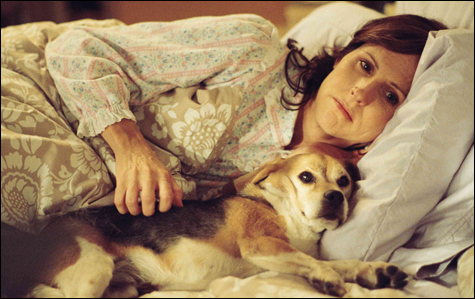Animal-rights activists flavor their philosophy with purity in Year of the Dog and a vegetarian food fest

YEAR OF THE DOG: Molly Shannon cuddles up with emptiness.
|
Future generations, should they arrive, will look back on us with perplexed shame much the way we look back on our ancestors. But which of our habits (the use of incendiary weapons on civilians, abortion, failure to live according to the dictates of Sharia, capitalism, homophobia, the destruction of the environment) will they choose to excoriate?
Both the Maine Animal Coalition’s recent Vegetarian Food Festival and Mike White’s new film Year of the Dog (screening at the Nickelodeon in Portland) explore the idea that the confinement and killing of animals is the great moral shame of our time. It certainly might be. It is impossible to encounter the evidence of cruelty offered by animal-rights activists, or to ponder the statistics they wield, and not feel affected. In Peter Singer the animal-rights movement has the most persuasive and clear-minded philosopher to lead a political cause since Karl Marx represented the working class. In Ingrid Newkirk, head of People for the Ethical Treatment of Animals, they have one of the most compelling, funny, creative, and resilient activist leaders at work in the world.
But it is the stories of the rank and file that dominate both the film and the rhetoric on hand at the festival. The true victims of animal cruelty cannot speak, or even think, for themselves. So the stories of activists — the conversion narratives conveying how they came to abhor cruelty — carry a special burden in this movement. While freed slaves and Holocaust survivors wrote moving tales of liberation and the return to humanity, animal-rights activists can only offer other humans a sort of ascetic ideal. But promises of purity always carry the danger of self-righteousness and contempt. Based on film and festival, these activists don’t so much love animals as disdain the rest of us.
It might not please political vegans that in becoming passionate about protecting animals Peggy Spade (Molly Shannon), at first the most pleasant and well adjusted character in Year of the Dog, becomes humorless, dishonest, thieving, emotionally abusive to children, and potentially murderous. The film opens with scenes of Peggy’s happy tolerance of coworkers and family — each of whom unknowingly convey the busy meaninglessness of life’s human pursuits, especially love, parenthood, and career. Peggy’s own meaning comes from a healthy partnership with her beagle Pencil. When Pencil is accidentally poisoned, Peggy begins to trade the messy empathy of being human for the purity of advocacy for the innocent.
White, who has written several films but makes his directorial debut here, has always fixated upon the funny-sad emptiness of modern life. His characters seem heroic for attempting to redeem existence even if they do so in ways that are quirky, misguided and doomed to fail. In giving Peggy the most righteous task White makes her the least sympathetic. He managed to depict someone more compelling in a woman engaging in marital infidelity with a teenager (The Good Girl), a man stalking a married friend he once fellated as an adolescent (Chuck and Buck), or an adult manipulating fourth graders (School of Rock). While White’s previous characters misstep in the name of human connection, in her embrace of animal rights Peggy (and perhaps White) gives up on difficult work of loving her own species.
While the closing montage is humanistic, Peggy seems alone in the crowd. She even gives up on the sort complex bond she had with Pencil. White wisely nods at what is disturbing about the human-pet relationship. Pencil dies when Peggy locks him outdoors for being a nuisance. Another pet is put down when his willful personality cannot be broken successfully. Peggy’s last name, Spade, and that of her friend from the animal shelter, Newt, allude to the disturbing reproductive control we exercise over even our beloved “companion animals” (as animal advocates call them).
There is much about the keeping of pets that is deeply weird. Imagine if some diabolical group decided to do to humans what we have done to dogs and cats — deliberately breed us over a period of millennia in a program of eugenics designed to make us more docile, more adorable, more eager to please (they might start by mating the undeniably cute and loyal Alberto Gonzales with wide-eyed Gemma Ward). They feed us dry pellets, lead us about on leashes, remove our reproductive organs, and stroke us absentmindedly when it pleases them. They watch us defecate. They make us hypoallergenic. They kill us humanely when we grow tiresome, or they force baroque medical procedures on us to prolong our lives in pain. Would we want to live that way? Is the life of a free-range chicken more disturbing than the life of the free-backyard pet dog? The one’s life is simply shorter, and when it’s over, we eat it.